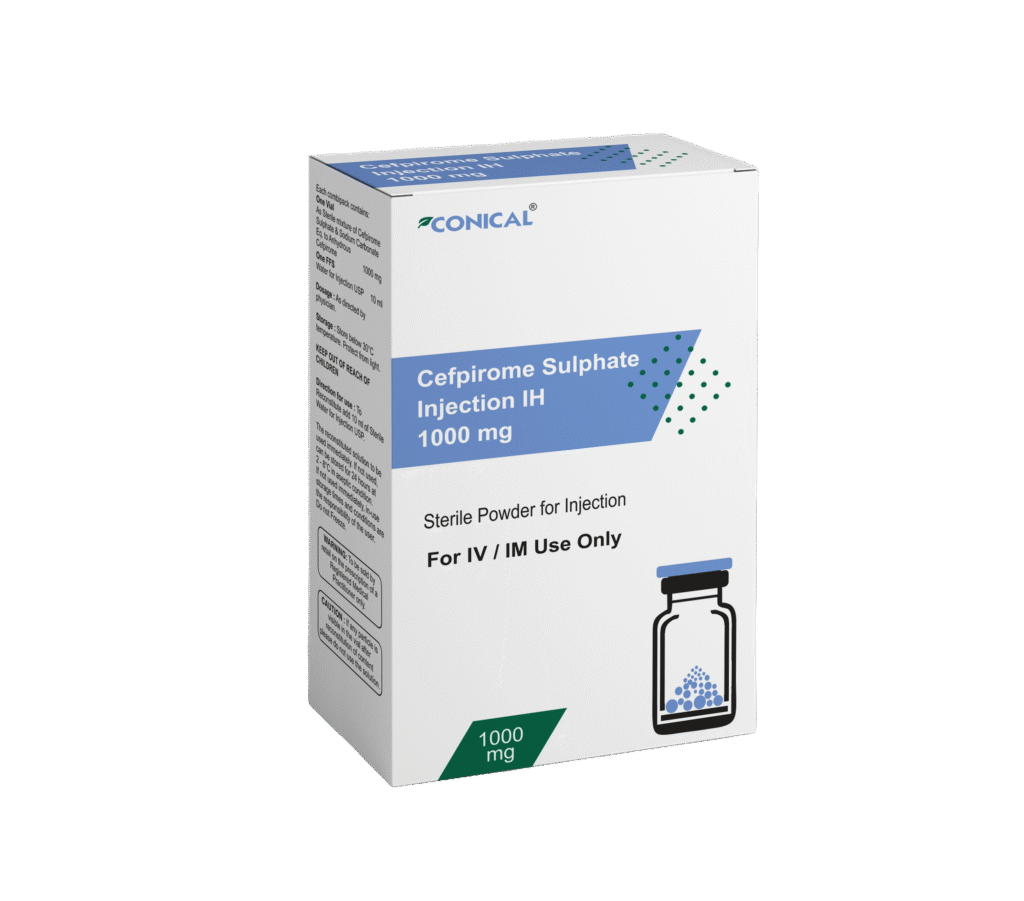
Uses of Cefpirome with Sulphate Injection 1000 mg
Respiratory Tract Infections.
Urinary Tract Infections
Bloodstream Infections
Infections in Immunocompromised Patients.
Skin and Soft Tissue Infections.
Bone and Joint Infections
Intra-abdominal and Genital Infections.
Surgical Prophylaxis
Cefpirome with Sulphate Injection 1000 mg is not effective against viral infections like the flu or the common cold. It is typically administered in hospitals via intravenous or intramuscular injection, and its use in children under 12 is limited due to insufficient data.
Cefpirome with Sulphate Injection 1000 mg Dosage & Administration Guide
Depends On:
Adults (with normal kidney function)
Elderly Patients
Children
Patients with Kidney Problems
Duration of Treatment
How to Prepare and Give Cefpirome with Sulphate Injection 1000 mg
Intravenous Injection (IV Push)
Short IV Infusion
Handling Tips
Hypersensitivity Reaction Side Effects of Cefpirome with Sulphate Injection 1000 mg.
Skin and Allergic Reactions.
These are typically type I hypersensitivity reactions, mediated by IgE antibodies, and can range from mild skin irritation to life-threatening anaphylaxis.
Neurological and Sensory Effects.
These may result from systemic immune activation or direct drug effects on the nervous system.
Gastrointestinal Effects
Liver Function Alterations
These may indicate drug-induced liver injury, often reversible upon discontinuation.
Renal Function Changes
Renal monitoring is crucial, especially with cephalosporins, as nephrotoxicity may necessitate stopping treatment.
Hematologic Changes.
These are often Type II or Type III hypersensitivity reactions, involving antibody-mediated cell destruction or immune complex deposition.
Local Injection Site Reactions.
Common with intramuscular or intravenous administration.
Risk of Superinfection
Regular monitoring is essential to detect emerging resistance or secondary infections.
Important Precautions for Cefpirome with Sulphate Injection 1000 mg
Allergies
Kidney Health
Blood Tests
Severe Diarrhoea Warning
Use in Children
Store below 30°C temperature. Protect from light.
Keep the medicine out of reach of children.
10 ml clear glass vial with bromobutyl rubber stopper, sealed with a flip-off aluminum seal.
Cefpirome with Sulphate Injection 1000 mg in a glass vial is supplied with a 10 ml plastic ampoule of diluent Sterilized Water for Injections USP in a unit carton with a pack insert.
Questions are useful tools, they open lines of communication; give us information; improve interactions, facilitate analysis, and many more.
A pharma CMO is a special kind of an organization, offering contract manufacturing services to pharmaceutical companies for various kinds of drug formulations.
Reduce overall costs and time to market :
Contract manufacturers already have the needed infrastructure and technical staff, so working with a CMO or CDMO can decrease the cost of manufacturing your pharmaceutical products.
Scalability and flexible production capacity :
You can produce what you need when you need it without worrying about excess capacity. Additionally, CMOs understand the importance of quality and compliance, so you don't have to sacrifice safety for scalability.
Save on upgrading and maintaining equipment :
If you have your manufacturing facility, you’ll have to pay to upgrade your equipment as technology advances—which can get expensive. A CMO/CDMO’s only function is to make and distribute products, so part of their core business responsibility is to update their equipment whenever needed and perform maintenance.
Ease supply chain issues :
During the pandemic, there were several instances of supply chain issues, including medicine shortages. CMOs are generally better equipped than startups to handle a supply chain crisis.
Bandwidth to focus on core competencies
When your company resources aren’t directly allocated to manufacturing and distribution, you have more time to focus on other tasks, like marketing your new drug, researching, or working on drug discovery.
We have 7+ manufacturing sites with a minimum of WHO GMP certification and other country-specific approvals like NAFDAC approved, PPK Kenya Approved, TFDA Tanzania Approved, EU-GMP Approved.
We have below manufacturing capacity:
For Tablet, Capsule, and soft gel: up to 1 million units per shift
For Syrup: up to 0.05 Million per shift
For Ampoule and Vial: up to 0.1 million units per shift
For Ointment and Cream: up to 0.1 million units per shift
For Suppository: 0.1 Million units per shift
Contact us directly to receive full information on the product, the formulation, the science behind it, stability data, and more. Our Business Development Manager is a click away.
Conical Pharmaceuticals is a professionally managed and dynamic organization with decades of experience in the pharmaceutical field. With a desire of providing opportunities for a better life, we work very hard to bring quality drugs to our customers. We have instilled a level of trust and confidence amongst our clients by supplying the best quality products.
